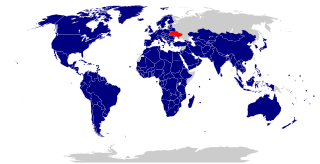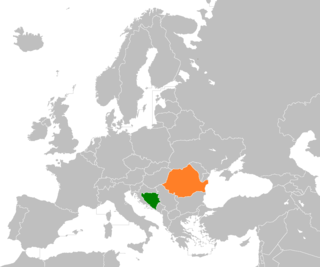
The Byelorussian SSR was one of only two Soviet republics to be separate members of the United Nations. Both republics and the Soviet Union joined the UN when the organization was founded in 1945.

After achieving independence from the Soviet Union, the Republic of Moldova established relations with other European countries. A course for European Union integration and neutrality define the country's foreign policy guidelines.

Ukraine has formal relations with many nations and in recent decades has been establishing diplomatic relations with an expanding circle of nations. The foreign relations of Ukraine are guided by a number of key priorities outlined in the foreign policy of Ukraine.

Uzbekistan joined the Commonwealth of Independent States in December 1991. However, it is opposed to reintegration and withdrew from the CIS collective security arrangement in 1999. Since that time, Uzbekistan has participated in the CIS peacekeeping force in Tajikistan and in United Nations-organized groups to help solve the Tajik and Afghan conflicts, both of which it sees as posing threats to its own stability. Uzbekistan is an active supporter of U.S. efforts against worldwide terrorism and joined the coalitions which have dealt with both Afghanistan and Iraq. It is a member of the United Nations, the Euro-Atlantic Partnership Council, Partnership for Peace, and the Organization for Security and Cooperation in Europe (OSCE). It belongs to the Organisation of Islamic Cooperation (OIC) and the Economic Cooperation Organization, which comprises 7 Central Asian countries: Pakistan, Uzbekistan, Kazakhstan, Turkmenistan, Afghanistan, Kyrgyzstan and Tajikistan. It is a founding member of and remains involved in the Central Asian Union, formed with Kazakhstan and Kyrgyzstan, joined in March 1998 by Tajikistan.

Raiffeisen Zentralbank Österreich A.G. (RZB) was a significant bank in Austria and the central institution of the Raiffeisen Banking Group (RBG) until its merger into its subsidiary Raiffeisen Bank International (RBI) in 2017.

Foreign relations between Argentina and Greece have existed for about half a century. Both countries are represented by an embassy in the other one's capital. According to the Greek foreign ministry, at least 50,000 persons of Greek descent live in Argentina with about 5,000 with Greek passports. The majority of Greeks live in Buenos Aires.

Croatia and Greece established diplomatic relations on July 20, 1992. Since November 1994, Greece has an embassy in Zagreb. Croatia has an embassy in Athens. The relations between Croatia and Greece have been regarded as excellent with a high cooperation between the two countries on the economic, touristic and political aspect. Greece was a key supporter during the accession process of Croatia to the European Union. Both countries are full members of the European Union, NATO and of the Council of Europe.

Larisa Miculeț is a Moldovan lawyer and diplomat, currently holding the position of the Chargé d’Affairs of the Embassy of the Republic of Moldova to Ireland. Previously, Mrs. Miculeț held the position of Ambassador at Large at the Ministry of Foreign Affairs and European Integration being in charge of Multilateral diplomacy, and concurrently serving as the Head of National delegation to IHRA.

Moldovan-Spanish relations are foreign relations between Spain and Moldova. On 30 January 1992, Spain established diplomatic relations with Moldova. Spain is represented in Moldova via its embassy in Bucharest in Romania.

The foreign relations of Bulgaria are overseen by the Ministry of Foreign Relations headed by the Minister of Foreign Affairs. Situated in Southeast Europe, Bulgaria is a member of both NATO and the European Union. It maintains diplomatic relations with 183 countries.

In 1991, Azerbaijan recovered its independence from the Soviet Union, which was recognized by Greece on December 31, 1991. Diplomatic relations were established in 1992. The Greek embassy in Baku was opened in the spring of 1993. The embassy of Azerbaijan in Athens was opened in August 2004.

Foreign relations between Austria and Georgia. Both countries established diplomatic relations in 1992 and Georgia opened its embassy in Vienna in 1996. Austria is represented in Georgia through a non resident ambassador based in Vienna, and through an honorary consulate in Tbilisi. Georgia has an embassy in Vienna and an honorary consulate in Graz. Austria is a member of the European Union, which Georgia applied for in 2022. Both nations are members of the Council of Europe.

Moldova–Switzerland relations are the bilateral relations between Moldova and Switzerland. Both countries established diplomatic relations on September 2, 1992. Moldova is represented in Switzerland through its embassy to the United Nations in Geneva. Switzerland is represented in Moldova through its embassy in Kyiv (Ukraine) and an honorary consulate in Chişinău. Since 1992 various senior Moldovan officials have visited Switzerland to discuss improvements in bilateral relations. Switzerland has provided significant aid to Moldova. Both nations are members of the Council of Europe.

Portuguese-Serbian relations date back to 1882. Portugal has an embassy in Belgrade, and Serbia has an embassy in Lisbon. Despite support by Portugal for the independence of Kosovo, Serbian Prime Minister Mirko Cvetković was keen to improve bilateral cooperation. Also, Portugal is backing Serbia's accession to the European Union (EU).
Relations between Moldova and Israel were established on 6 June 1992. Israel recognized Moldova on 25 December 1991. Israel is represented in Moldova through its embassy in Chișinău and Moldova has an embassy in Tel Aviv. Though the volume of trade between Israel and Moldova was low as of 2006, Larisa Miculet, the third Ambassador of Moldova to Israel has stated that there numerous untapped potential of increasing bilateral trade. For Israeli entrepreneurs and investors, Moldova is geopolitically convenient because of its location in the center of Europe, its high transparency between public authorities and foreign investors and due to it having eliminated most of the bureaucratic barriers that hinder business activities. Various business sectors of cooperation between Israel and Moldova range from pharmaceuticals, energy, information technology and software, electronics and electronic equipment, power engineering, metal and plastics processing and construction materials but Moldova has stressed foreign Israeli investments in all segments of the Moldovan economy.

Foreign relations exist between Azerbaijan and Romania. The countries have established embassies in their respective capitals. The Azeri president visited Romania in October 2004 and the two nations have signed over fifty separate agreements to date. Azerbaijan has an embassy in Bucharest. Romania has an embassy in Baku. Both countries are full members of the Council of Europe.

Bosnia and Herzegovina–Romania relations are bilateral relations between Romania and Bosnia and Herzegovina. Both countries are full members of the Southeast European Cooperation Process, Southeast European Cooperative Initiative, Organization for Security and Co-operation in Europe, and Stability Pact for South Eastern Europe. Bosnia and Herzegovina has an embassy in Bucharest. Romania has an embassy in Sarajevo.

Moldova–Slovenia relations are the bilateral relations between Moldova and Slovenia. Moldova recognized the Republic of Slovenia under an unknown date. Diplomatic relations were established on October 27, 1993. Both countries are represented in each other through their embassies in Budapest (Hungary). Slovenia is a member of the European Union, which Moldova applied for in 2022. Both countries are full members of the Council of Europe.

Barbadian-French relations are the bilateral relations between the two countries, Barbados and France. Both countries have established diplomatic relations on May 3, 1968. Barbados is represented in France through its embassy in Brussels (Belgium). France is represented in Barbados through its embassy in Castries, led by and an additional honorary consulate in Bridgetown.

Greece and Kazakhstan established diplomatic relations on 1 October 1992. Greece opened an embassy in Almaty in February 1997. Kazakhstan opened an embassy in Athens in 2005. Kazakhstan has had an honorary consulate in Athens since 1998.





















